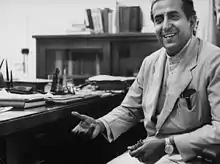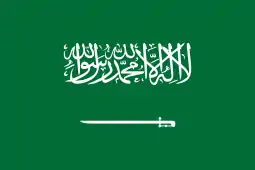Abdullah Tariki
Abdullah ibn Hamoud Tariki (19 March 1919 – 7 September 1997) (Arabic: عبدالله الطريقي), also known as Red Sheikh,[1] was a Saudi politician and government official. He was the first Saudi oil minister appointed by King Saud, and co-founder of Organization of Petroleum Exporting Countries (OPEC) along with Venezuelan minister Juan Pablo Pérez Alfonso.
Abdullah Tariki | |
|---|---|
 | |
| Minister of Petroleum and Mineral Resources | |
| In office December 1960 – 9 March 1962 | |
| Prime Minister | King Saud |
| Preceded by | Office established |
| Succeeded by | Ahmed Zaki Yamani |
| Personal details | |
| Born | 19 March 1919 Zulfi, Emirate of Nejd and Hasa |
| Died | 7 September 1997 (aged 78) Cairo, Egypt |
| Nationality | Saudi Arabian |
| Alma mater | Cairo University University of Texas |
Early life and education
Tariki was born on 19 March 1919 in Al Zulfi in Najd.[2] His father was a Najdi townsman[3] and was a camel owner who organized caravans between Saudi Arabia and Kuwait.[4] His mother was a bedouin.[3]
Tariki received his early education in Kuwait and in Cairo.[5] He held a bachelor's degree in geology and chemistry which he obtained from Cairo University in 1944.[2] He graduated from the University of Texas in 1947, earning a master's degree in petroleum engineering and geology.[2][6] He was also trained at the Texas Oil Company after graduation.[2][7]
Career and activities
After training in the US, Tariki returned to Saudi Arabia and worked at the ministry of finance office in Dammam from May 1953 to December 1954.[6] He served as an interpreter at the initial phase of his career at the ministry.[8] In December 1954, Tariki was appointed director-general of petroleum and mineral affairs in the ministry of finance and national economy.[6][9] Tariki's work at the directorate involved processing the petroleum production statistics provided by the Arabian American Oil Company (Aramco), and analysis summaries were then presented to the Saudi royal family. In May 1959 he was named one of two representatives of the Saudi government as directors of the Aramco.[10] The other one was Hafiz Wahba.[10] They were the first Saudi director of the company.[10]
In fact, Tariki was one of the earliest critics of Aramco, arguing that the US companies should consult more with Saudi officials in exploring, pumping and selling of oil.[11] He called for the nationalization of Arab oil.[12] To achieve this goal, he and Venezuela's mines minister Juan Pablo Perez Alfonso strongly supported the foundation of the OPEC and eventually became founding members of it in September 1960.[5][13]
The ministry of petroleum and mineral resources was created in December 1960, and Tariki was appointed the first oil minister.[14][15] Tariki joined Prince Talal bin Abdulaziz's camp, Free Princes Movement, in 1961,[16] and they accused Crown Prince Faisal, later King Faisal, of corruption.[14] Tariki became a powerful ally of the movement.[4] He claimed on evidence that Kamal Adham, who was the brother-in-law of Prince Faisal, got 2% of the profits of the Arabian Oil Company that had been cofounded by Saudi Arabia and Japan.[14]
Tariki was removed from office by Prince Faisal as a result of the clash between him and Kamal Adham in 1962.[5][17][18] More specifically, King Saud was forced to dismiss him and four other members of the cabinet following his announcement of the constitution which had been developed by Free Princes movement members with the help of Egyptian lawyers.[19] The others who were asked to resign from the office included Hasan Nasif, Abdallah Al Dabbagh, Ibrahim Al Suwayil and Nasir Al Manqur.[19] The Sudairi Seven led by Prince Fahd were very influential in this campaign against Tariki and others.[19] Tariki was succeeded by Ahmed Zaki Yamani as oil minister.[14] Yamani sacked Tariki also from Aramco's board.[14]
Later years
Following his dismissal, Tariki went to exile and settled in Beirut.[12][14] In January 1963, he and Lebanese oil expert Nicholas Sarkis founded an oil consulting firm in Beirut.[6] Tariki also launched a journal there, namely Arab Oil and Gas.[20] He could visit Saudi Arabia only after the death of King Faisal in 1975.[4] Later he settled in Cairo.[21]
Personal life and death
When Tariki was attending the University of Texas he married an American women.[22] They later divorced in Saudi Arabia.[22] Tariki died of a heart attack on 7 September 1997 in Cairo at age 78.[23][24] His body was taken to Saudi Arabia for burial.[21]
Honors
References
- "Irresistible Libyan Crude". Middle East Online. 10 April 2011. Retrieved 6 March 2013.
- Joe Neal (May 1961). "A Sheikh of Arabia". The Alcalde.
- William Rugh (Winter 1973). "Emergence of a New Middle Class in Saudi Arabia" (PDF). Middle East Journal. 27 (1): 7–20.
- Kai Bird (2010). Crossing Mandelbaum Gate: Coming of Age Between the Arabs and Israelis, 1956-1978. Simon and Schuster. p. 125. ISBN 978-1-4391-7160-8.
- Youssef M. Ibrahim (16 September 1997). "Sheik Abdullah al Tariki, 80, First Saudi Arabian Oil Minister," New York Times.
- Stephen Duguid (July 1970). "A Biographical Approach to the Study of Social Change in the Middle East: Abdullah Tariki as a New Man". International Journal of Middle East Studies. 1 (3): 195–220. doi:10.1017/s0020743800024168. JSTOR 162327.
- Robert Vitalis (2007). America's Kingdom: Mythmaking on the Saudi Oil Frontier. Stanford University Press. p. 23. ISBN 978-0-8047-5446-0.
- Steffen Hertog (2007). "Shaping the Saudi state: Human agency's shifting role in the rentier state formation" (PDF). International Journal of Middle East Studies. 39 (4): 539–563. doi:10.1017/S0020743807071073.
- Steffen Hertog (2008). "Petromin: the slow death of statist oil development in Saudi Arabia" (PDF). Business History. 50 (5): 645–667. doi:10.1080/00076790802246087. S2CID 154116939.
- "Two Sheiks Join Aramco Board; Named to Represent the Government of Saudi Arabia". The New York Times. 22 May 1959.
- "Saudi oil ministers past and present". Reuters. 25 February 2011.
- Sukrī M. Ġānim (1986). OPEC: The Rise and Fall of an Exclusive Club. KPI. p. 28. ISBN 978-0-7103-0175-8.
- M. S. Vassiliou (2009). Historical Dictionary of the Petroleum Industry. Scarecrow Press. p. 364. ISBN 978-0-8108-6288-3.
- M. S. Vassiliou (2009). The A to Z of the Petroleum Industry. Scarecrow Press. p. 496. ISBN 978-0-8108-7066-6.
- Yitzhak Oron, Ed. (1961). Middle East Record Volume 2, 1961. The Moshe Dayan Center. p. 419. GGKEY:4Q1FXYK79X8.
- Vijay Prashad (2007). The Darker Nations- A Biography of the Short-Lived Third World. LeftWord Books. p. 275. ISBN 978-81-87496-66-3.
- Simon Henderson (1994). "After King Fahd" (Policy Paper). Washington Institute.
- Steffen Hertog (2010). "The Emerging Bureaucratic Order under Faisal". Princes, Brokers, and Bureaucrats: Oil and the State in Saudi Arabia (PDF). Cornell University Press. p. 74. ISBN 9780801447815. JSTOR 10.7591/j.ctt7zbkq.10.
- Rosie Bsheer (February 2018). "A Counter-Revolutionary State: Popular Movements and the Making of Saudi Arabia". Past&Present. 238 (1): 247.
- Brandon Roy Wolfe-Hunnicutt (2011). The End of the Concessionary Regime: Oil and American Power in Iraq, 1958-1972. Stanford University. p. 153. STANFORD:TM772ZZ7352.
- "Former Saudi oil minister dies". Associate Press. Cairo. 10 September 1997.
- Madawi al-Rasheed (April 2010). A History of Saudi Arabia. Cambridge University Press. p. 88. ISBN 978-0-521-76128-4.
- Obituary: "Abdullah ibn Hamoud Al Tariki," Washington Post. 12 September 1997.
- "Abdullah Al Tariki, 80, A Co-founder of Opec". Chicago Tribune. London. 21 September 1997.
- Terzian, Pierre. (1985). OPEC, the Inside Story: The Inside Story, p. 31.
